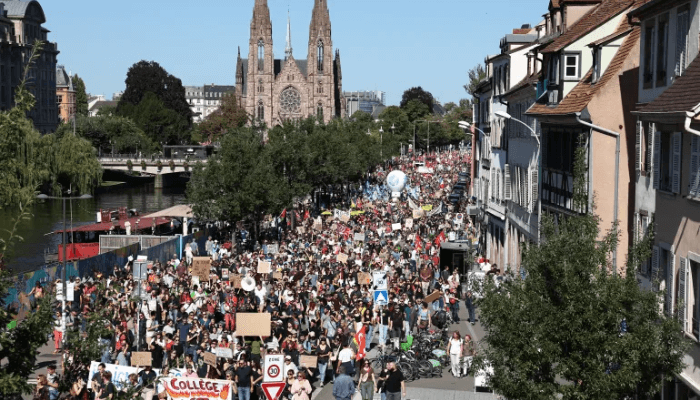By Faith Omoboye
Copyright businessday

France came to a near standstill on Thursday as workers launched a nationwide strike against President Emmanuel Macron’s plans to slash public spending, in what has become the biggest wave of unrest since last year’s pension battle.
Teachers, health staff, transport workers and pharmacists walked out, forcing school closures, shutting nine in ten pharmacies, and crippling the Paris Metro. Roadblocks and rallies swept across Paris, Lyon, Lille and Marseille, where protesters also targeted an arms factory accused of supplying Israel.
Read also: Macron under pressure as France’s parliament ousts prime minister
The protests were sparked by proposed budget cuts for 2026, initially introduced by François Bayrou the former prime minister, who warned of a “life-threatening” debt burden. His plan sought to trim €44bn ($52bn) from public spending through measures such as freezing pensions, raising healthcare costs and scrapping two public holidays. The proposals were fiercely opposed both in parliament and on the streets, contributing to Bayrou’s downfall in July after just nine months in office.
Read also: France boosts Nigeria’s creative sector with increased investments
His successor, Sébastien Lecornu, has scrapped some measures but failed to calm unions, who say ordinary people are being made to “pay the price” while the rich and corporations are spared.
Thursday’s strikes rippled across major cities, including Paris, Lyon, Lille and Marseille, where protesters blocked roads and picketed factories. At the Eurolinks arms plant in Marseille, demonstrators accused the site of supplying Israel and unfurled a banner reading: “Shut down the genocidal factory.” Palestinian flags were seen at several marches, underscoring the way domestic grievances have intertwined with global conflicts.
Read also: Pan-African conference in Dakar targets France’s economic hold
The Louvre, Arc de Triomphe and parts of Paris’s underground system were closed, frustrating tourists as well as commuters. The national rail operator SNCF warned of delays on some high-speed trains, although most services continued.
Unions argue the cuts would hit the vulnerable hardest—workers in insecure jobs, retirees and the sick—while sparing the wealthy and corporations. They demand higher taxes on the rich and business subsidies reduced instead. Many also continue to press for the reversal of President Emmanuel Macron’s deeply unpopular pension reform, which raised the retirement age from 62 to 64 last year.
For Macron, already weakened by low approval ratings, the strikes highlight the scale of the political challenge ahead. Lecornu’s appointment has yet to stabilise the government, with opposition leaders such as Olivier Faure of the Socialist Party dismissing his budget pitch as “vague” and warning they would support a no-confidence vote if held today.



